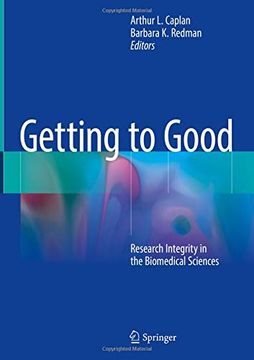Reseña del libro "Getting to Good: Research Integrity in the Biomedical Sciences (en Inglés)"
Research in the biomedical sciences is in crisis. Challenges to integrity resulting from fraud, plagiarism, misconduct, mishandling of research subjects and predatory publishing are everywhere. In order to meet its social mission the biomedical sciences are urgently in need of a unified concept of research integrity, defined as the trustworthiness of scientific quality and the ethical justifiability of research practices. Encompassing regulated areas -- subject protection, research misconduct and conflict of interest as well as newly quantified concerns about research bias and non-reproducibility, this book brings together the full range of practices and policies that should support research honestly produced and disseminated. It also specifically incorporates those topics noted by the NIH as essential and required for training in the responsible conduct of research (RCR). We have enclosed emails from two teachers of RCR attesting to the fact that there currently is no standard text or canon of readings that meet the demand that exists for teaching materials in this area. The BookThe reader first frames the concept of research integrity and whether its performance is heading toward institutional corruption in the biomedical sciences. It then reviews evidence of the effectiveness of current governmental and self-regulation by the scientific community, from public participation and from meta-science studies, all of which are venues for intervention that will improve research integrity. The bulk of the Reader consists of the best classic publications and case examples in each of several areas: policy, methods, research subjects protection, conflicts of interest, research misconduct, plagiarism, reproducibility and whistleblowing as well as additional topics required for RCR instruction: mentor/mentee responsibilities and relationships, responsible authorship, peer review, and trustworthy data acquisition and management. CompetitionThere is no other book that addresses this range of topics. Recent scholarship has illuminated the extent of unethical but unregulated practices that have wasted resources, misinformed the public, and caused harm. Previous books have examined a particular section of the regulated landscape: Cohen & Lynch (eds), Human subjects research regulation: perspectives on the future, MIT Press, 2014; and Barbara K. Redman?s Research misconduct policy in biomedicine; beyond the bad apple approach, MIT Press, 2013. Most recently, the Interacademy Partnership has released Doing global science: A guide to responsible conduct in the global research enterprise, Princeton University Press, 2016. This slim volume reviews perspectives from national academies of science across the globe, reflecting their involvement in addressing issues of responsible conduct of research. Its emphasis is on the need for internationally harmonized standards, briefly enumerating research practices that should and should not be adopted. Discussion is very general whereas Getting to Good presents in-depth consideration of the full range of issues in research integrity and subject protection.Currently, courses, both the many required and elective in research integrity are using individual readings, frequently narrow in scope, often reflecting only the four NIH-required areas of instruction in responsible conduct of research. They neglect the broader set of issues and the overarching framework for research integrity because there is no single source that covers the entire spectrum of topic areas contained in this reader.At this time, there is a no competition for any comparable reader. Pressures for countries to meet international standards create a built-in market for this book. We anticipate a worldwide, broad and growing market for Getting to Good. The National Science Foundation records more than 54,000 research doctorates awarded by US institutions in 2014. China now outpaces that number and is still growing. The number of science doctorates awarded in OECD member countries stands at 34,000, a growth of 40% since 2009. By 2020 India expects to be graduating 20,000 PhDs per year. These examples reflect a significant expansion of individuals and institutions that require effective and in-depth education in research ethics and integrity. Instruction at the undergraduate and masters level expands the potential market even further.AudienceGetting to Good will have two major audiences: those receiving mandatory graduate and undergraduate research training around the world; and government regulators and institutions, again around the world, that are promoting economic and social development through biomedical science. These nations including China, India and Russia, face competition from other countries in producing reliable and ethical science. The United States, through the NIH Fogarty and other programs, the UK and other European countries have, for more than two decades, been investing in research development and ethics infrastructure throughout the in developing worls. There is a huge market for a text that will permit the systematic teaching of research ethics and integrity.

